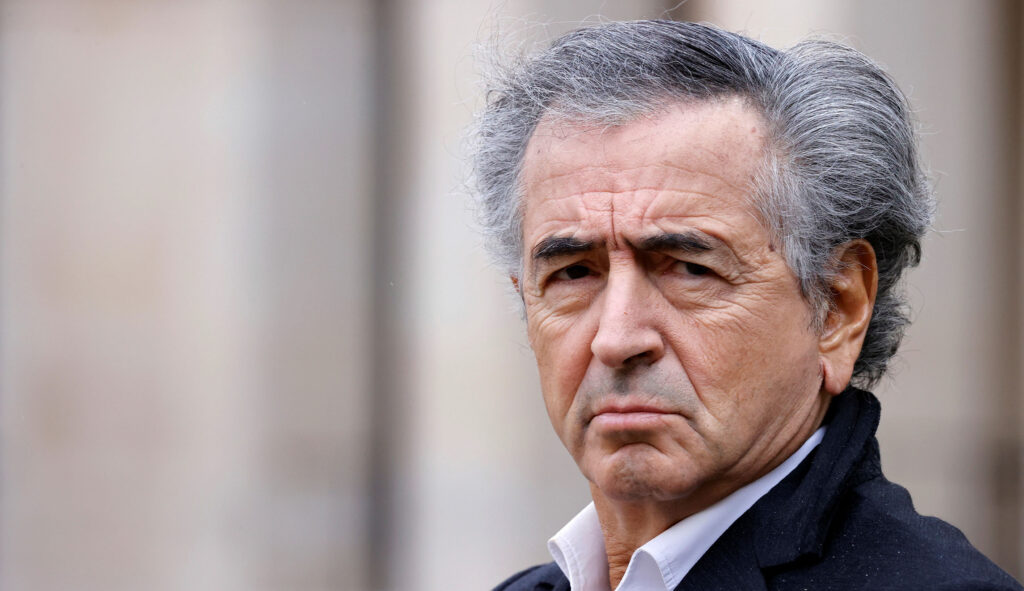The Ukrainian ambassador to France is a courtly man who discharges his duties with all the gravitas of an envoy of a nation at war. Yet, at a ceremony on Jan. 16, he allowed his somber Slavic face to break into a smile — broad and uninhibited — as he pinned a ribbon and medal on the lapel of the French philosopher and filmmaker before him.
The honoree, Bernard-Henri Lévy, was receiving the Order of Merit, Ukraine’s equivalent of a knighthood, for his tireless, eloquent, and, above all, courageous advocacy on behalf of the Ukrainians in forums across Europe and the U.S. Lévy has written about the war in newspapers and magazines, addressed countless public and private meetings, and badgered diplomats on Ukraine’s behalf at Western chanceries and at the United Nations. Three weeks ago, he even held a screening on Capitol Hill of his last documentary on the war in Ukraine, Glory to the Heroes, attended by an impressive cohort of congressmen and staffers. They were, Lévy says in an interview at his apartment, “visibly moved as they saw scenes of women and children who’d been driven from their homes by the Russians, and images of mutilated Ukrainian soldiers insisting they wanted to go back to battle.”
Politicians, he believes, can “lack imagination. They have figures, and charts, and statistics in their heads. But they don’t have faces.” They saw these faces — Ukrainian faces — in Lévy’s film, and in doing so they saw “the truth on the ground.”

Lévy, 75, has been to Ukraine a dozen times since Vladimir Putin’s army invaded in February 2022. He sees himself as a defender of Ukraine with his “own weapon — which is not a gun, but a camera and a pen.” Every time he goes, his wife and children worry for his safety, for when he’s there he ventures to the front lines. There, he documents not just the barbarities inflicted on Ukraine by the Russian invaders but also “the incredible bravery and morale of Ukrainian troops.”
Glory to the Heroes, which premiered in the U.S. in the first week of December, is Lévy’s third documentary on Ukraine. In each, he’s sought to capture the courage of the Ukrainians — soldiers and civilians alike — who are fighting an “existential battle not just for themselves but also for the rest of the free world.” This last space, says Lévy, is dwindling fast. “We live in a world now that looks more and more like a huge, illiberal jail.” Two-thirds of humanity, he reckons, live in “jail-states.” He names some of them for me: “China, Russia, Turkey, a lot of the Islamic countries.” India, he says, is “on the edge. Illiberal for sure, but not fascist.”
Ukraine, he believes, offers us an “exit gate, through which we can exit into freedom. That’s why Putin invaded Ukraine, because he knows it will be a model for other countries if it succeeds, including Russia.” If Ukraine loses, he sees peril for the Baltic states, for Poland, too, and Moldova. “Putin will not stop.”
It is his ambition to persuade as many American politicians as he can to see Ukraine as he sees it, especially those Republicans who dwell myopically on our southern border and berate those who argue that a great country like the U.S. can fortify its own borders and supply Ukraine with weapons at the same time. Rhetorically, but effectively, he has argued that one of America’s borders lies on the frontier between Ukraine and Russia.
At this border, he says, “America has boots on the ground — the boots of President Zelensky and his people.” They are fighting our war as much as their own, he insists. “So what should you do if you are a responsible American president, Democrat or Republican? You should arm those with boots on the ground, who are defending the whole family, defending all of Europe.”
CLICK HERE TO READ MORE FROM THE WASHINGTON EXAMINER
In his acceptance speech for his Ukrainian knighthood, Lévy — not religiously observant “but still deeply a Jew” — concluded by invoking a Hebrew word, kavod. It means, he explains, “an honor. An honor but also a burden. A burden which signifies responsibility.” He’s referring here not just to his own responsibility to speak out for Ukraine, but also to the responsibility embraced by the “magnificent Ukrainians” to fight the Russians on behalf of the free world.
In doing so he points also to the responsibility borne by Washington and by all Americans. That is, to engage in a battle that could determine whether victory will come to the free world or come instead to the world’s jailers.
Tunku Varadarajan is a contributing writer for the Wall Street Journal’s editorial page and a fellow at the American Enterprise Institute.
